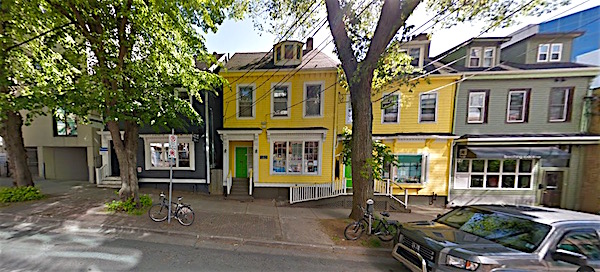20 Nov Halifax imposes a tax on wheelchair ramps. Or is it a fine?

Halifax Mayor Ron Wallace Edmund Morris Mike Savage was on CBC Radio Wednesday, taking calls about small business property taxes when Liz Crocker, owner of Woozles Childrens Bookstore, the yellow building pictured above, rang up with a complaint.
Like Savage, Crocker is a life-long Liberal, and she’s strategic enough to be polite when lobbying a politician. But you could tell she was annoyed at various burdens the city places on small business.
“When I got my tax bill this year, I was surprised to see an ‘encroachment fee’ for the wheelchair ramp I installed.”
Believe it or not, this is standard operating procedure in HRM. The same building and bylaw inspectors who seem congenitally incapable of enforcing building code accessibility standards nevertheless pounce with alacrity whenever a small business owner takes the initiative to outfit their property with equipment that welcomes people in wheelchairs.
Mobility rights activist Gus Reed has the whole story, amusingly told, on the James McGregor Stewart Society blog. He points out how HRM’s official hostility to accessibility rights limits the employment opportunities available to people who use wheelchairs, thus driving up welfare costs—and the taxes that support them.
Back in the CBC studio, the mayor bobbed, the mayor weaved. He boasted of a “a partnership” between the city and the Parker Street Skills Development Centre to provide businesses with portable ramps. (In fact, that project is entirely paid for by a generous donation from Reed, who has been unable to get any accounting of how many ramps have been deployed, or where.)
His worship spoke feelingly the hardship wheelchair ramps impose on wheelchair-users trying to pass by on the sidewalk. (I am not making this up, as Dave Barry might say.)
Savage’s approach to disability rights is an amalgam of happy talk, failure to enforce existing rules, excuses for not passing tougher ones, and punitive action against businesses that try to do the right thing. He could solve Liz Crocker’s problem in three minutes by going down the hall to the CEO’s Richard Butts’s office (on a day when Butts happened to be visiting from his home in Toronto) and ordering the inspection department to start enforcing the building code and stop fining wheel chair ramps.
